Welcome to the February 2015 issue of the Global Washington newsletter.
IN THIS ISSUE
- Letter from our Executive Director
- Question of the Month
- Women in the News: Leaders in Philanthropy Inspire Audience to “Turn and Pull”
- Featured Organization: Hands for Peacemaking Foundation
- Changemaker: Jacinta Tegman, President, World Concern
- Welcome New Members
- GlobalWA Member Events
- Career Center
- GlobalWA Events
Letter from our Executive Director
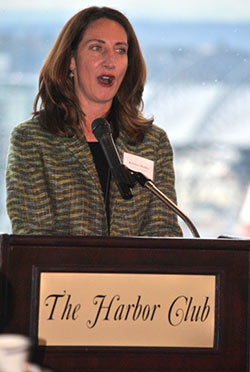 Only 17% of attendees at last month’s World Economic Forum in Davos were women. This is discouraging if we are to believe that WEF stands for equity and economic growth worldwide. In contrast, 97% of attendees at this month’s Global Washington and Waldron co-sponsored event were women. Rosario Perez, CEO of Pro Mujer and a panelist at our event after returning from WEF in Davos, exemplifies why we need more female leaders in the nonprofit and philanthropic communities. Renee Kaplan from the Skoll Foundation and Dean Sandra Archibald from the Evans School of Public Affairs at UW joined Ms. Perez on the panel. Each shared candid views and personal stories about their rise to leadership roles. Over 100 women (and a few good men) participated in the conversation.
Only 17% of attendees at last month’s World Economic Forum in Davos were women. This is discouraging if we are to believe that WEF stands for equity and economic growth worldwide. In contrast, 97% of attendees at this month’s Global Washington and Waldron co-sponsored event were women. Rosario Perez, CEO of Pro Mujer and a panelist at our event after returning from WEF in Davos, exemplifies why we need more female leaders in the nonprofit and philanthropic communities. Renee Kaplan from the Skoll Foundation and Dean Sandra Archibald from the Evans School of Public Affairs at UW joined Ms. Perez on the panel. Each shared candid views and personal stories about their rise to leadership roles. Over 100 women (and a few good men) participated in the conversation.
As we approach International Women’s Day on March 8, I’d like to highlight the 44 Global Washington members working in 130 countries to improve the lives of women and girls. These organizations address issues such as education, access to clean water, healthcare, land rights, economic development, and human rights. Please take a moment to learn more about these groups on our Member Map.
And, if you are moved to further support high-impact nonprofits based in our region improving lives abroad, I hope you will take a look at the newly released Global Philanthropy Guide. It provides insights on the effective organizations that call Washington their home and the world their workplace, many of which work with women and children and are Global Washington members.
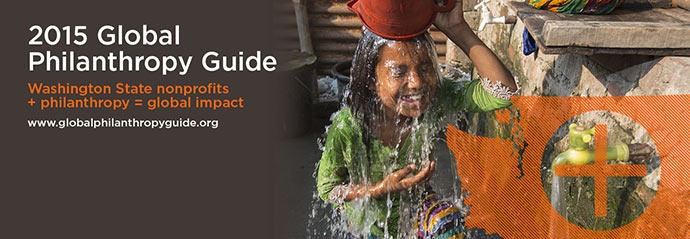 Investing in women is often found to be the most effective means to reduce poverty in developing countries. In fact, the World Bank has data to demonstrate that “gender equality and economic development are inextricably linked.” The data showed that “equality not only guarantees basic rights but also plays a vital role in promoting the robust, shared growth needed to end extreme poverty in our increasingly competitive, globalized world.”
Investing in women is often found to be the most effective means to reduce poverty in developing countries. In fact, the World Bank has data to demonstrate that “gender equality and economic development are inextricably linked.” The data showed that “equality not only guarantees basic rights but also plays a vital role in promoting the robust, shared growth needed to end extreme poverty in our increasingly competitive, globalized world.”
I’m proud that Washington state has so many remarkable organizations that empower women worldwide, and is home to women leaders promoting women-centered development.
Sincerely,

Kristen Dailey
Executive Director
Question of the Month
![]() GlobalWA will ask you a question every month and synthesize the responses and make available to our member organizations. Please take a moment to respond to the question for this month:
GlobalWA will ask you a question every month and synthesize the responses and make available to our member organizations. Please take a moment to respond to the question for this month:
Is your organization looking for new board member(s)?
Women in the News
Leaders in Philanthropy Inspire Audience to ‘Turn and Pull’
By Danyal Lotfi
 Professionals from a diverse cross-section of industries gathered on February 5 to hear from three established women leaders in academia, the non-profit sector and philanthropy. Over 100 women and a handful of supportive men engaged in a discussion co-hosted by Waldron and Global Washington.
Professionals from a diverse cross-section of industries gathered on February 5 to hear from three established women leaders in academia, the non-profit sector and philanthropy. Over 100 women and a handful of supportive men engaged in a discussion co-hosted by Waldron and Global Washington.
The panelists included Dr. Sandra Archibald, Dean of the Evans School of Public Affairs at University of Washington; Renee Kaplan, Chief Strategy Officer at Skoll Foundation; and Rosario Perez, President and CEO of Pro Mujer. Global Washington Executive Director Kristen Dailey kicked off the event and Melissa Merritt, Vice President of Waldron and a member of Global Washington’s Board of Directors, moderated the conversation.
Each panelist opened with a brief story about her journey to social sector leadership. They spoke about the importance of persistence and resilience in the face of adversity. Dr. Archibald proudly shared her strategy of identifying boundaries and then tackling them head-on, because, “[my] parents taught me not to be afraid of much, which is fundamental to being able to break boundaries.”
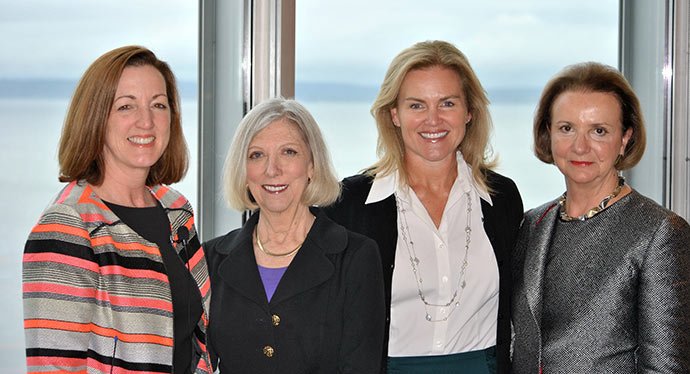 The panelists also addressed Sheryl Sandberg’s controversial yet pertinent book, Lean In. Kaplan was quick to give her perspective. “I was fired up after reading that book, [because] we are [already] taking on so much.” Kaplan believes that women need to set healthy boundaries for themselves and that the culture around work/life balance needs to change. Dr. Archibald added that a career path is a jungle gym rather than a ladder. “Know that if you take a step back, you still have that jungle gym that you can climb as far as you want to take it.”
The panelists also addressed Sheryl Sandberg’s controversial yet pertinent book, Lean In. Kaplan was quick to give her perspective. “I was fired up after reading that book, [because] we are [already] taking on so much.” Kaplan believes that women need to set healthy boundaries for themselves and that the culture around work/life balance needs to change. Dr. Archibald added that a career path is a jungle gym rather than a ladder. “Know that if you take a step back, you still have that jungle gym that you can climb as far as you want to take it.”
Perez and Kaplan both argued that “you can’t have it all, all the time” and that you often have to make tough choices. Perez believes there is a strong need for more support services that allow women to better balance their work and family responsibilities.
When asked about professional mentorship, the speakers all agreed on its importance. Perez advised everyone to seek a sponsor in his or her workplace. She challenged the audience to bring women’s sponsorship initiatives directly to their supervisors; company-wide women’s sponsorships have shown to be more effective than mentorship in preliminary studies. Dr. Archibald discussed how she chooses her mentees, telling the audience that she looks for someone who takes initiative and interest in her work and, if she’s confident in their ability and work ethic, she will sponsor that person for years to come.
While Dr. Archibald acknowledged the progress in women’s professional advancement over the last several decades, she added that the barriers women faced used to be very obvious, but now exist in a more subtle way. These barriers, she believes, are often hidden in criteria for leadership and executive roles.
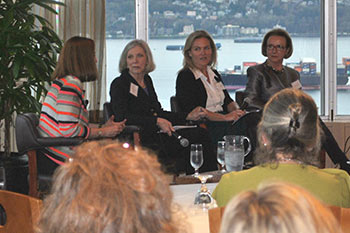 During the audience Q&A, a participant asked, “How do we get more women into public policy?” Dr. Archibald spoke of the extensive efforts already underway to encourage young people, especially young women, to seek careers in public policy. “We can create the environment and we can try to change the culture. Women come at public policy from a very different perspective. If you encourage women to get into public policy, you get those perspectives.”
During the audience Q&A, a participant asked, “How do we get more women into public policy?” Dr. Archibald spoke of the extensive efforts already underway to encourage young people, especially young women, to seek careers in public policy. “We can create the environment and we can try to change the culture. Women come at public policy from a very different perspective. If you encourage women to get into public policy, you get those perspectives.”
Dr. Akhtar Badshah, a Global Washington Board member and one of the few men present at the event, asked the panelists whether they’ve seen any backlash in the countries they work in because of the growing focus on programs to promote women’s empowerment. Pointing to women’s rights campaigns in India and Senegal, Kaplan spoke of how an initial backlash can happen but can also be overcome. She stressed that having women who are indigenous leaders is critical to any program success. Kaplan believes it’s essential to allow indigenous leaders, familiar with local culture and social dynamics, to pursue changes on the ground.
In closing remarks, Kaplan recounted a phrase coined by former U.S. Women’s National Soccer Team Captain Julie Foudy. “We have to do the ‘turn and pull.’ Sometimes you have to turn and pull [other women] forward, because that’s one of the most important and effective ways of helping one another.”
Featured Organization
Hands for Peacemaking Foundation
By Charlotte Dawkins
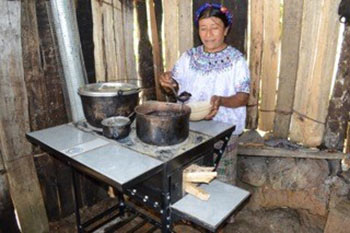 Santa Cruz Barillas is a city in the mountainous region of Huehuetenango in western Guatemala, close to the Mexican border. Agriculture is the largest source of revenue in Barillas, and the average worker makes between $3.50 and $6.00 per day. Although high levels of poverty plague the area, it is also rich in biological and ethnic diversity. Most of the people living in Barillas are Maya and speak the Mayan dialect called Q’anjob’al or Kanjobal. In the entire country, a total of 22 different Mayan dialects are spoken.
Santa Cruz Barillas is a city in the mountainous region of Huehuetenango in western Guatemala, close to the Mexican border. Agriculture is the largest source of revenue in Barillas, and the average worker makes between $3.50 and $6.00 per day. Although high levels of poverty plague the area, it is also rich in biological and ethnic diversity. Most of the people living in Barillas are Maya and speak the Mayan dialect called Q’anjob’al or Kanjobal. In the entire country, a total of 22 different Mayan dialects are spoken.
Over the past eight years, Barillas has seen the exploitation of local resources by foreign companies. The area has been identified as a rich source of metals, hydro power and petroleum, and successive administrations have courted international investment from Colombia, Canada and Spain. There are now approximately fifteen hydroelectric dams in various stages of planning and development in the area, as well as plans for oil extraction and mining.
Hands for Peacemaking Foundation, an Everett-based non-profit and Global Washington member, was created by Leeon Aller, MD and his wife Virginia in 1985. Aller, a family physician from Snohomish, WA, travelled to Guatemala as part of the National Guard and became passionate about helping those living in remote areas of the country. The focus of Hands for Peacemaking is to help provide opportunities for economic development, improve health conditions, and increase access to education by installing water supplies, building storage tanks, latrines, schools, school materials, and cooking stoves.
“On top of citizens not having an education, most of them don’t know how to get out of poverty. It’s passed down from generation to generation and, since most have such large families, the cycle of poverty just keeps on going,” said Pete Kinch, Hands for Peacemaking’s Executive Director, on his foundation’s current focus. “We’re trying really hard to break that cycle.”
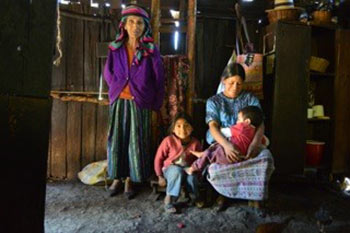 The Mission Center, located in Barillas, is Hands for Peacemaking’s center of operations, providing a space for work teams to launch into surrounding villages. The nearby Aller Skill Center is a place to teach locals employable skills and is where the foundation’s products are built.
The Mission Center, located in Barillas, is Hands for Peacemaking’s center of operations, providing a space for work teams to launch into surrounding villages. The nearby Aller Skill Center is a place to teach locals employable skills and is where the foundation’s products are built.
“The education system has vastly improved from when I first went down there in 2000. At that time, they would complete the first grade and would then go out and work in the fields. Now it’s up to the sixth grade, and even university level with five universities in town — Universidad Davinci, Universidad San Carlos de Guatemala, Universidad Panamericana, Universidad Rural de Guatemala and Universidad Mariano Galvez. We hope that by building schools and helping people get an education in the villages, their schooling will eventually continue through high school.” In 2014, the foundation built two more two-classroom schools and has built over 11,000 school desks to date, becoming the largest manufacturer of desks in the Barillas area.
Another product, the Aler stove, was created by the foundation as an alternative to the commonly used indoor open fire, which is known to cause respiratory illness and death. This high-efficiency stove vents outside and is estimated to burn 65% less wood than open fires. Over 1,200 stoves have been built to date.
Hands for Peacemaking is committed to involving Guatemalans throughout each step of the product development process. “All of the work we do, they have to perform or pay a portion thereof,” said Kinch. “We’ve found that the ‘something for nothing’ mentality doesn’t benefit anybody, and that it’s really important for the Guatemalans to participate” For example, an Aler stove costs $200, of which the villagers will pay $20. Once they pay off their stove, they own it. It’s important to them because they have invested in that stove.
It’s the same with schools. Guatemalans have to buy the land and help build the school so they have ownership of it. “When we come back two to three years later and the school has been painted multiple times, it’s a strong clue they have taken ownership and are very much involved in the value of it,” said Kinch. “It’s not just our school.”
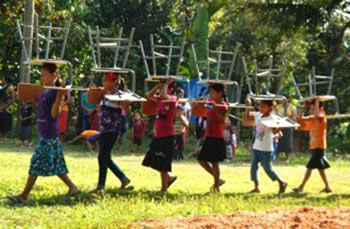 Two Hands for Peacemaking projects on the horizon are updating their old Land Cruiser, which is used to transport groups from Guatemala City to their work area, and getting more funding for a continuing project in the village of El Porvenir. “We’re putting in water tanks that will be able to store 2,500 liters of water that was caught in the rainy season and make it available during part of the dry season. It will save time from not having to continuously go down the mountain to the river which is five to six miles away. We were able to raise money for half the village and we would like very much to raise $15,000 to do the second half of the village.”
Two Hands for Peacemaking projects on the horizon are updating their old Land Cruiser, which is used to transport groups from Guatemala City to their work area, and getting more funding for a continuing project in the village of El Porvenir. “We’re putting in water tanks that will be able to store 2,500 liters of water that was caught in the rainy season and make it available during part of the dry season. It will save time from not having to continuously go down the mountain to the river which is five to six miles away. We were able to raise money for half the village and we would like very much to raise $15,000 to do the second half of the village.”
Kinch believes that Hands for Peacemaking has a unique ability to help Guatemalans because, as he says, “We’ve been there a long time and consistently, whereas most of the other organizations have come and gone.” “We’ve continued to stay,” said Kinch.
Though poverty is endemic in the region, Hands for Peacemaking is doing something about it. They have been highly effective at both providing job opportunities and building products that make life easier for those living in the rural villages of Guatemala, and will continue to do so for years to come.
Changemaker
Jacinta Tegman, President, World Concern
By Kaitlin Marshall
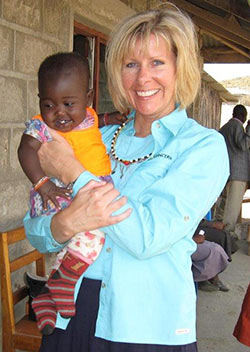 As media outlets keep pace with a 24-hour news cycle, images of suffering and devastation around the globe fill the airwaves each and every day. One can easily become paralyzed wondering how they can have an impact on the world when there are countless people who need help. “One story at a time,” advises Jacinta Tegman, President of Global Washington member World Concern. For Tegman, global impact starts with changing the life of just one individual.
As media outlets keep pace with a 24-hour news cycle, images of suffering and devastation around the globe fill the airwaves each and every day. One can easily become paralyzed wondering how they can have an impact on the world when there are countless people who need help. “One story at a time,” advises Jacinta Tegman, President of Global Washington member World Concern. For Tegman, global impact starts with changing the life of just one individual.
Tegman was born and raised in the Seattle area. Her parents were Northern European immigrants and their connection to the international community exposed Tegman early on to different cultures and backgrounds. The global perspective Tegman developed growing up quickly became ingrained in her life and motivated her to look for opportunities for international work.
After “settling into the American dream” with her family, as Tegman describes, she took stock of her life. She wondered, “Is just having all this stuff really what I’m about?” Tegman’s search for answers took her to central Mexico where she and her husband served as missionaries for nine years. While in Mexico, they witnessed how poverty and hunger prevent people from realizing their full potential. The experience lit a fire in Tegman.
After returning to the United States, Tegman joined a church staff and, over time, found herself developing a sense of restlessness. Nearly a decade after her missionary service ended, she decided to shift her career path. Living in Mexico for over a decade made Tegman realize that her life “had more meaning and purpose then just [her] own personal comfort.” She wanted to once again work somewhere where she could utilize her ambition to bring aid and meaning to people’s lives. Tegman looked for an organization that supported her personal aspirations and whose mission matched her own passions. In June 2008, Tegman became the Donor Relations Director at World Concern.
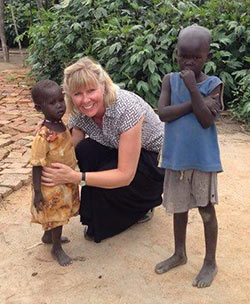 Founded in 1955, World Concern this year celebrates 60 years of serving the poor overseas. Since its founding, the organization has continuously expanded. Today it has community development and disaster response projects in twelve countries, the majority of which are in Asia and Africa. The organization strives to provide opportunity and hope in some of the world’s poorest, hard-to-reach places. It balances immediate relief efforts with a focus on development projects that will help communities flourish long-term.
Founded in 1955, World Concern this year celebrates 60 years of serving the poor overseas. Since its founding, the organization has continuously expanded. Today it has community development and disaster response projects in twelve countries, the majority of which are in Asia and Africa. The organization strives to provide opportunity and hope in some of the world’s poorest, hard-to-reach places. It balances immediate relief efforts with a focus on development projects that will help communities flourish long-term.
In addition to serving as World Concern’s Donor Relations Director, Tegman also held the role of Senior Director of International Operations before becoming president of the organization in October 2013. Says Tegman, “We help those living in extreme poverty…and yet we do it in a way that gives dignity and value to the people we serve. It isn’t just a handout, but it’s helping people to uncover their own potential. At the core, we’re all human beings and we all want the opportunity to grow and flourish.”
The idea that change starts with impacting just one life is integral to Tegman’s leadership style. While visiting unreached communities in Sri Lanka this past summer, Tegman stopped in an isolated village where countless children roamed the beach unsupervised. Many of their mothers had resorted to prostitution to survive. One little girl stands out in her memory. “Her father had died, her mother had abandoned her, and she was living with grandparents who were too old to care for her. She was alone and so vulnerable,” recalled Tegman.
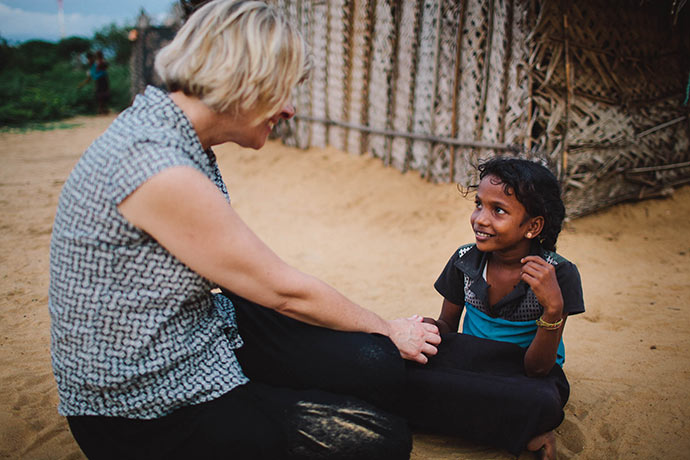 The face of that little girl is etched in Tegman’s memory. She realized that, even if she could help just that one child, she would be making a difference. “I remember promising our country director that, whatever it took, we would care for and protect that little girl,” said Tegman. And she kept that promise. In late 2014, World Concern started a child protection program in this village.
The face of that little girl is etched in Tegman’s memory. She realized that, even if she could help just that one child, she would be making a difference. “I remember promising our country director that, whatever it took, we would care for and protect that little girl,” said Tegman. And she kept that promise. In late 2014, World Concern started a child protection program in this village.
Tegman encourages others interested in international development to avoid thinking broadly because it can be paralyzing. “Think of that little girl who is without a parent right now, who is lost and alone and suffering. Start with caring about that one life.”
Welcome New Members
Please welcome our newest Global Washington members. Take a moment to familiarize yourself with their work and consider opportunities for support and collaboration!
Cascades Level
Alliance for Children Everywhere: Alliance for Children Everywhere (ACE) is a 501(c)(3) Christian nonprofit founded in 1969 under the name House of Samuel. In Zambia, ACE operates two rescue homes for abandoned infants, orphans and young children in crisis. ACE provides assistance to extended families, acts as adoption advocates, provides infant formula to babies at risk of abandonment or starvation, and offers free Christian education to children who cannot attend school due to family poverty. www.childreneverywhere.org
Amigos de Santa Cruz Foundation: Amigos is a nonprofit working to improve education, health and economic development in the indigenous communities of Santa Cruz la Laguna, Guatemala. www.amigosdesantacruz.org
Washington Nonprofits: Washington Nonprofits builds strong, collaborative network of nonprofits serving Washington communities through advocacy, education and capacity building. www.washingtonnonprofits.org
Member Events
February 19: US Fund for UNICEF // Not My Life screening and panel discussion
February 20-23: Community Colleges for International Development // CCID 39th Annual Conference
February 21: NPH USA // Carnival for a Cause
February 26: Shoreline Community College // Myths of Globalization
February 28: Mobility Outreach International // 12th Annual Steps to Healing auction and gala
March 5: Village Health Works // 2015 Strength in What Remains Dinner
March 13: Landesa // 9th Annual Seed the Change Luncheon
Career Center
Highlighted Paid Positions
In-Country Director – Amigos de Santa Cruz Foundation
Information Systems Officer – Global Partnerships
Lead Software Developer – Grameen Foundation
Director of Development – PeaceTrees Vietnam
For more jobs and resources, visit https://globalwa.org/resources/careers-in-development/
GlobalWA Events
February 18: New Member Orientation
February 19: Executive Director Roundtable
February 26: Networking Happy Hour with Friends of GlobalWA, Humanosphere and World Affairs Council